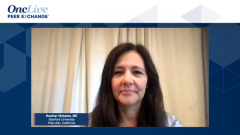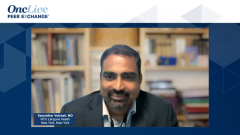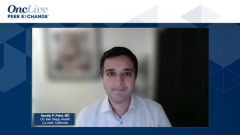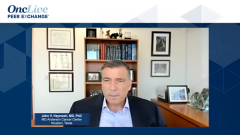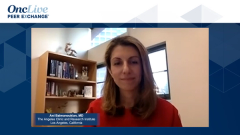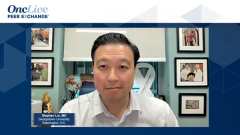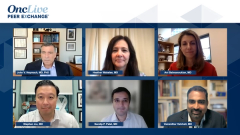
Selecting First-line Treatment for EGFR-Mutant NSCLC
Heather Wakelee, MD, shares insight on factors to consider when approaching the optimal first-line therapy for patients with EGFR-mutant advanced NSCLC.
Episodes in this series

John V. Heymach, MD, PhD: Heather, you’ve heard about the different options. What goes into your treatment decisions about what to use first for these patients? I know you treat a lot of EGFR- [epidermal growth factor receptor]-mutant non-small cell lung cancer there in California.
Heather Wakelee, MD: Yes, we certainly do have a lot of patients who have EGFR-mutant non-small cell lung cancer. We do tend to use first-line osimertinib [Tagrisso]. I will mention that we do have the US Cooperative Group led by ECOG-ACRIN [Cancer Research Group] with osimertinib plus bevacizumab [Avastin]. Now, we’ve seen some data in the last few months that we all have to still wonder what is that role of combining VEGF [vascular endothelial growth factor] with osimertinib, though there’s lots of data with some of the other EGFR [epidermal growth factor receptor] TKIs [tyrosine kinase inhibitors] and lots of research over many years, as you and I know well, John.
John V. Heymach, MD, PhD: Um hmm.
Heather Wakelee, MD: But, at this point, we’re still tending to use osimertinib. I think about whether adding chemotherapy is a good question. We’ve seen some data again with first- and second-generation drugs, ongoing trials with osimertinib with chemotherapy. But until we see data that clearly shows that that additional toxicity is truly going to lead to longer survival. And not just, I think, progression-free survival [PFS] when you’re combining things isn’t enough. If you’re going to combine up front, we need to see that OS [overall survival] benefit. At this point, I’m still just using osimertinib, but these are all the things I’m thinking about and talking about with patients and certainly excited to see more trials because we’ve really struggled with that.
John V. Heymach, MD, PhD: Heather, let me dig into that point you were making in a little more detail about progression-free survival versus overall survival. Let’s say you take osimertinib and chemotherapy. Let’s say progression-free survival is a bit longer, but that amount longer is just about the amount of time as if you had used them separately instead of using them together. If that were the case, do you think it should be approved and is it something you would use in that setting?
Heather Wakelee, MD: In the data that we have so far, there have been 2 trials with gefitinib [Iressa], I believe, it was a first-generation drug. In Japan, they did a beautifully conducted trial of patients who either got first-line EGFR TKI alone or with chemotherapy and mandated that for those getting EGFR TKI, next step had to be the same chemotherapy that they would have had in combination. You had these end points, PFS1, PFS2, and then OS. The PFS1 was better with the combination than with the single drug, but when you looked at PFS2, which was the time point where every patient had to have both the EGFR and TKI and chemotherapy, they were identical…except there was a survival benefit to giving the combination. Also, that’s why we’re all still so intrigued and that’s I think why the next-generation osimertinib plus chemotherapy study is ongoing.
The other data we have came out of India. It was a well conducted randomized trial of gefitinib plus or minus chemotherapy. The challenge there is that many of the patients who got just the gefitinib never got chemo-platinum doublets, and so you can’t really look at OS differences because there it becomes a matter of availability of drugs. That also showed this PFS and OS benefit. However, it wasn’t the same sort of comparison, we’ll conduct a trial given limited resources they had to do it.
Thus, there’s these questions, and I think from a patient perspective you have an option of a year or two or maybe longer just taking a TKI and have life pretty normal versus jumping in to this IV [intravenous] infusion and being kind of stuck with having to go in regularly. There’s a big decision point from that perspective, from a patient quality of life. Now, if it involves longer survival, I think a lot of people would make that decision, but until then I think that’s why we haven’t seen a lot of pickup of using the combination or of any combinations, chemotherapy or VEGFR [vascular endothelial growth factor receptor] IV. Anything that involves infusion people wanted to wait.
John V. Heymach, MD, PhD: I think there is at least a possibility that giving them 2 up front, even if PFS2 isn’t longer but you might kill more of these more drug-tolerant persisters that you’re not killing with the EGFR inhibitor. That’s why you might get longer overall survival. From your perspective, does it take longer overall survival before you’d stick them together up front?
Heather Wakelee, MD: Yes. I think so. It does take a while to get to that end point and of course if some new miracle gets developed along the way, then that changes things. But at least from where we stand right now with the options, though they’re growing, but still limited post-OSI [osimertinib], I think that that OS benefit is important if you’re going to bring chemotherapy in early. Chemotherapy needs to be there at some point. I’m a big believer in chemotherapy for patients with EGFR-mutated tumors but not necessarily up front.
John V. Heymach, MD, PhD: OK. Well, thanks. That’s really insightful comments there. It’s been really helpful.
Transcript Edited for Clarity


